
Gender and Culture at the Limit of Rights PDF
Edited by Dorothy L. Hodgson
Part of the Pennsylvania Studies in Human Rights series
Description
An interdisciplinary collection, Gender and Culture at the Limit of Rights examines the potential and limitations of the "women's rights as human rights" framework as a strategy for seeking gender justice.
Drawing on detailed case studies from the United States, Africa, Latin America, Asia, and elsewhere, contributors to the volume explore the specific social histories, political struggles, cultural assumptions, and gender ideologies that have produced certain rights or reframed long-standing debates in the language of rights. The essays address the gender-specific ways in which rights-based protocols have been analyzed, deployed, and legislated in the past and the present and the implications for women and men, adults and children in various social and geographical locations.
Questions addressed include: What are the gendered assumptions and effects of the dominance of rights-based discourses for claims to social justice?
What kinds of opportunities and limitations does such a "culture of rights" provide to seekers of justice, whether individuals or collectives, and how are these gendered?
How and why do female bodies often become the site of contention in contexts pitting cultural against juridical perspectives?The contributors speak to central issues in current scholarly and policy debates about gender, culture, and human rights from comparative disciplinary, historical, and geographical perspectives.
By taking "gender," rather than just "women," seriously as a category of analysis, the chapters suggest that the very sources of the power of human rights discourses, specifically "women's rights as human rights" discourses, to produce social change are also the sources of its limitations.
Information
-
Download - Immediately Available
- Format:PDF
- Pages:312 pages, 1 illus.
- Publisher:University of Pennsylvania Press
- Publication Date:17/05/2011
- Category:
- ISBN:9780812204612
Information
-
Download - Immediately Available
- Format:PDF
- Pages:312 pages, 1 illus.
- Publisher:University of Pennsylvania Press
- Publication Date:17/05/2011
- Category:
- ISBN:9780812204612










